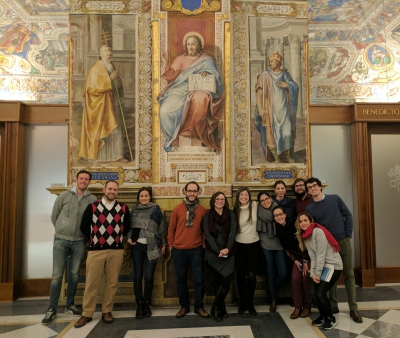
My experiences at the 2017 Winter School in Greek Paleography and Codicology at the American Academy in Rome are impossible to encapsulate in language, but the following is my halting attempt to do so. I had the good fortune to travel to the Eternal City nearly a week before the program began in the company of my friend and fellow Duke colleague, Laura Camp, so that we might enjoy a preemptive taste of la dolce vita. One of our most memorable experiences was a trek out to the monastery of Montecasino, any paleographer’s dream. We not only were able to feast upon its many treasures, manuscripts, and heartbreaking views of mist and mountains, but were able to enjoy mass there accompanied by the unforgettable Gregorian chant of the monks.
When we arrived at the American Academy in Rome on a cool, blue morning of January, the somewhat idyllic mood we had heretofore indulged was (perhaps fortunately) broken by our first paleographical exercise—we were given a facsimile of a Greek manuscript and were asked to read it aloud before all of our peers without any preparation! Having no previous experience in Greek paleography, I was understandably daunted by being thus compelled, and stumbled through the difficult letter forms as best I could. I was subsequently heartened, but also immensely challenged, by the following week of intensive training which I received under the tutelage of a preeminent Greek paleographer, Niels Gaul, who is currently A.G. Leventis Professor of Byzantine Studies at the University of Edinburgh, and two Vatican Librarians, Andraś Nemeth and Timothy Janz. We not only were exposed to various hands and scripts from late antiquity to the Palaiologan period, but also received illuminating lectures on the historical context of manuscript production in Byzantium and a detailed seminar on Eastern codices. The “blood, sweat, and tears” of this portion of my journey, while perhaps the most fruitful and invaluable to the advancement of my scholarly endeavor, are the most difficult to encompass with description. Suffice it to say that all of the work I intend to do in future on late Greek epic poetry, textual criticism, and Byzantine studies will benefit incalculably from such thorough and expertly-guided training.

We spent the following week at the Vatican Library itself, a privilege and an honor for which no gratitude is adequate. We received a private tour of the Sala Sisto and much enjoyed (though with an insuppressible twinge of fear) the Latin inscription therein which specified that any who mistreated the library’s manuscripts would be brutally tortured and excommunicated. When we finally had the benefit of inspecting those treasured manuscripts themselves, I was reminded of those perfectly-turned verses of Emily Dickinson:
A precious, mouldering pleasure ’tis
To meet an antique book
In just the dress his century wore;
A privilege, I think,
His venerable hand to take,
And warming in our own,
A passage back, or two, to make
To times when he was young.
I certainly can furnish no better language for the feeling. We each received two manuscripts to peruse and gave a presentation on our findings to consummate the program. The two I was assigned, Ott. gr. 342 and 381, an annotated, Palaiologan Iliad and a late 12th century collection of New Testament writings and synaxaria, respectively, provided me with livelong days of joy, absorption, and mystery. We were also priveleged and enlightened throughout the course of this latter week by the presentations of two distinguished paleographers. The first presenter, Dr. Daniele Bianconi, shared some of his victories and tribulations throughout his life of experience as a paleographer struggling to identify difficult hands; the second was the famous Monsignor Paul Canart, whose charming philosophy of the paleographer’s mission was delivered in limpid and elegant French. All of these paleographical adventures in Italy will aid, enchant, and (very happily) enrich me forever, and my gratitude to Duke, its department of Classical Studies, my professors, the American Academy in Rome, the Bibliotheca Apostolica Vaticana, and all the many others who endeavored to make this odyssey possible, will be unrepayable forever.